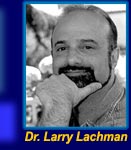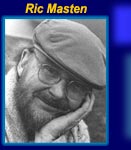PARALLEL JOURNEYS A Spirited Approach to Coping and Living with Cancer
reviewed by Daniel J. Benor, MD
 Larry Lachman is a psychologist who had surgery at age 39 for prostate cancer that presented as a single nodule. Ric Masten, an author and poet, was diagnosed at age 69 with an aggressive form of prostate cancer that had already spread. He has had surgery, radiation and chemotherapy.
In Parallel Journeys, which they co-author, each writes of his experiences in his own way. Larry Lachman is a psychologist who had surgery at age 39 for prostate cancer that presented as a single nodule. Ric Masten, an author and poet, was diagnosed at age 69 with an aggressive form of prostate cancer that had already spread. He has had surgery, radiation and chemotherapy.
In Parallel Journeys, which they co-author, each writes of his experiences in his own way.
Lachman presents linear descriptions and psychological analyses that are well organized and extremely helpful – as could only be written by someone who has both experienced dealing with cancer and has helped many others to deal with cancer. Masten wonderfully parallels all of the issues discussed by Lachman through poetry that is trenchantly honest, spoken from the heart, and yet maintains a centeredness that is utterly refreshing. Masten’s poetry is on the even pages; Lachman’s prose on the odd pages.
The book is utterly engaging to read. Similar experiences are shared in these two very different styles. In addition, each inserts meta-observations and comments in the margins about their own narratives and each other’s.
Here is a typical example, contrasting each of the authors’ styles of approaching their cancers:
LACHMAN: “On Thursday, May 1, 1997, I met with a colon/rectal specialist. He took a medical history and performed an exam. It was then that he felt the infamous “nodule” on my prostate. He tried to assure me that it was probably nothing – most likely a benign calcification. But to be safe, he was referring me to an urologist for an ultra-sound examination.
On May 19th, I received “that’ infamous call from the urologist, informing me that I had prostate cancer. He told me, ‘…The biopsies came back. Four samples were negative and the fifth was positive for adenocarcinoma of the prostate. It looks like you have prostate cancer. I can’t believe it either. I’m sorry. I’m truly sorry.’
(pp. 3, 5)
 MASTEN: “Of course the doctor is most optimistic about all the new and miraculous treatments available. But before I go into that, I want you to know that I find myself experiencing a strange and wonderful kind of peace. Hell, I’ve lived nearly 70 years already – done exactly what I wanted to do with my life. All worthwhile dreams have come true. Made my living since 1968 as a ‘Performance Poet’ – Billie Barbara and I have been together for 47 years – growing closer with each passing day. We have four great kids, five neat and nifty grandchildren. All things considered, I’ve been truly blessed and whether my departure date is next year or 15 years from now I’m determined not to wreck my life by doing a lousy job with my death. (p. 2) MASTEN: “Of course the doctor is most optimistic about all the new and miraculous treatments available. But before I go into that, I want you to know that I find myself experiencing a strange and wonderful kind of peace. Hell, I’ve lived nearly 70 years already – done exactly what I wanted to do with my life. All worthwhile dreams have come true. Made my living since 1968 as a ‘Performance Poet’ – Billie Barbara and I have been together for 47 years – growing closer with each passing day. We have four great kids, five neat and nifty grandchildren. All things considered, I’ve been truly blessed and whether my departure date is next year or 15 years from now I’m determined not to wreck my life by doing a lousy job with my death. (p. 2)
Lachman has excellent suggestions for dealing with practical issues of managing the physical and emotional aspects of the illness, as well as for psychological pacing of healing efforts. He makes suggestions I have not seen elsewhere, such as doing your best to put together several teams of support people, so that they can take turns and then no one person gets worn out in being helpful. He clearly has had a wealth of lessons from his own illness that deepens and enriches his advice to others. Here are further suggestions, in his own words:
LACHMAN: Respect your style of coping. You will cope with surgery best if you are aware of your preferred way of handling stress. There are two major ways of coping with surgery; both are considered to be ‘active’ styles of coping. They are: Avoidant Copers – Those of us who don’t want to be overwhelmed with information that we don’t need or be asked to make too many decisions. They way and avoidant coper reduces stress is by saying, ‘Just knock me out and get it over with doc. Spare me the gory details.’
And then there are the Vigilant Copers – Those of us who want a sense of control over our situation by seeking out a great deal of information before surgery. ‘I want to know who, when, what, and where doc. Take me through it step by step. Don’t skip any details.’ Both approaches to coping are valid ways of confronting the life crisis of surgery. Both approaches are examples of how you can be an active participant in your own treatment. (p. 69, 71)
Denial gets a bad rap. Without a healthy dose of denial, we would never leave the house due to continually possibilizing all the catastrophic events that could befall us as we go about our day-to-day activities. (p. 23)
By creating my own healing narrative… as well as using the SANITYMatrix™ described in chapter 2, I was able to soulfully construct my own story about what my experience was in having cancer and how I felt about it. I was able to determine what type of relationship I wanted to have with my illnesses. I was beginning to put a new face on my inner Humpty Dumpty- reformulating what I wanted to do from here on and how I wanted to do it.
…I began to formulate my Five Insights For Recovery. I was beginning to map out how I would finally be able to embrace my new after-cancer self. The five insights for recovery that I came up with were:
1. Let go of all resentments.
2. Spend time helping other cancer patients.
3. Set boundaries and being real—saying what I mean and meaning what I say.
4. Reclaim a spiritual path by connecting with a religious or spiritual community.
5. Change my pace of living from having to be always-on-the-go to being more balanced, relaxed and centered. (p. 161, 163)
I found this book appealing not only for the contrasts and blends of presentations, but for the poetry of Masten itself, which I like and find to be moving, educational and enlightening. Here is one of Masten’s own favorites:
WHO’S WAVING??
I ain’t waving babe, I’m drowning
Going down in a cold lonely sea
I ain’t waving babe, I’m drowning
So babe quit waving at me
I ain’t waving babe, I’m crying
I’m crying, oh why can’t you see?
I ain’t fooling babe, I ain’t fooling
So babe quit fooling with me
This ain’t singing babe, it’s screaming
I’m screaming that I’m going down
And you’re smiling babe, and you’re waving
Just like you don’t hear a sound
I ain’t waving babe, I’m drowning
Going down right here in front of you
And you’re waving babe, you keep waving
Hey babe, are you drowning too/
Oh (p. 126)
Masten’s sprightly continuous-line cartoon drawings also liven up the book.
This excellent book is strongly recommended for people dealing with cancer themselves, or close to someone facing this challenge.
Daniel J. Benor, M.D. is a medical doctor and wholistic psychiatric psychotherapist who includes bodymind approaches, spiritual awareness and healing in his practice. Author of Healing Research, Volumes I-IV, he is a Founding Diplomate of the American Board of Holistic Medicine, Coordinator for the Council for Healing, a non-profit organization that promotes awareness of spiritual healing, and editor of the International Journal of Healing and Caring Ð On Line www.ijhc.org. Healing research site:www.WholisticHealingResearch.com
Ric Masten's poems and one-line drawings are featured at: http://psa-rising.com/voices/
PSA Rising prostate cancer survivor news
http://www.psa-rising.com ©1997-2004
April 24, 2004 |

 Books
Books 
 Books
Books